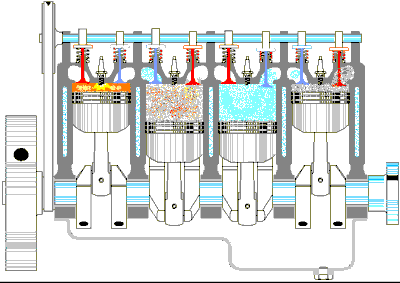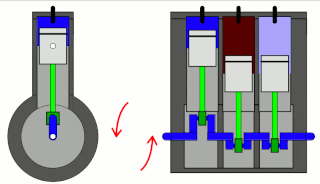3 Cylinder vs 4 Cylinder Engines: Which One is for You?
Published On 3/6/2024, 1:48:08 pm Author Nitesh YadavChoosing between a three-cylinder, four-cylinder, or six-cylinder engine depends largely on your driving needs and preferences. If you mostly drive in the city and want a car with good fuel efficiency, a three-cylinder engine could be a good choice. For those who need more power for highway driving and prefer a smoother ride, a four-cylinder engine would be more suitable. And if you prioritize performance and can afford the higher costs, a six-cylinder engine provides a powerful and refined driving experience.

The last generation that bothered about cylinders, gearboxes, DI, turbo and other mechanical specifications was the millennial. GenZ are more focused on whether there is an air purifier or not, ventilated seats, cruise, ADAS etc. that makes driving a smooth experience. However, a true petrolhead and automotive enthusiast does take the engine into account. If you think you love cars but you are not aware of even what cylinders are and which kind of cylinders, whether 3 or 4, should be chosen, then this blog is for you. If you are ultra-rich who can afford a 6 cylinder engine, then we will explain 6 cylinders as well!
What are cylinders in the car
Think of the cylinder in your car's engine as a powerhouse. Inside, gasoline and air mix and ignite with the help of a spark plug, causing a small explosion. This explosion pushes a piston up and down inside the cylinder.
The piston's up-and-down motion, known as linear motion, is then converted into rotational motion by the crankshaft. The crankshaft takes this straight movement and turns it into a spinning action, which is crucial for driving your car's wheels.
Next, the gearbox steps in to adjust this rotational motion to the right speed and power. It then sends this optimized rotational force to the axle, which turns the wheels and makes your car move. So, from the cylinder’s explosions to the piston's movement, through the crankshaft and gearbox, everything works together to get your car rolling smoothly down the road.
Most cars and SUVs have engines with multiple cylinders, usually four, six, or eight. The more cylinders an engine has, the more power it can produce. This is because multiple cylinders allow for more frequent combustion events, meaning more mini-explosions and more power generated within the engine.
In a multi-cylinder engine, the cylinders work in a coordinated sequence. For instance, in a four-cylinder engine, each cylinder fires (ignites the fuel-air mixture) at a different time. This staggered firing ensures that the power output is smooth and continuous, reducing vibrations and providing a steady stream of power to the crankshaft.
When more cylinders are added, like in a six or eight-cylinder engine, the power becomes even more robust and smooth. This is why high-performance cars and larger vehicles, such as trucks and SUVs, often have engines with more cylinders. These engines can handle more demanding tasks, like quick acceleration and towing heavy loads.
3 Cylinder engines

Three-cylinder engines are typically associated with city cars due to their small size and good fuel efficiency. They are lighter, compact, and have less internal friction because they have fewer moving parts. This makes them a great choice for city driving.
Companies focus on building three-cylinder cars for several reasons. First, they are more cost-effective to produce. With fewer cylinders and components, the manufacturing process is simpler and cheaper. This cost saving can then be passed on to the consumer, making three-cylinder cars an attractive option for budget-conscious buyers.
Second, three-cylinder engines are more environmentally friendly. They consume less fuel and produce fewer emissions compared to larger engines. This aligns with the growing demand for greener, more sustainable vehicles, and helps automakers meet stringent emissions regulations.
Lastly, advancements in technology have improved the performance of three-cylinder engines significantly. Turbocharging and direct fuel injection have made these engines more powerful and efficient, providing a good balance of performance and economy. This allows city cars to have enough power for daily driving needs while maintaining excellent fuel efficiency, making them a practical and appealing choice for urban commuters.
4 Cylinder Engines

Four-cylinder engines are often preferred for a wider range of vehicles, including midsize sedans, SUVs, and even some sports cars, due to their balance of power and efficiency. While they might not be as small or lightweight as three-cylinder engines, four-cylinder engines offer distinct advantages that make them suitable for various driving needs.
Firstly, four-cylinder engines provide more power and smoother performance compared to three-cylinder engines. With an additional cylinder, these engines can produce more horsepower and torque, which is beneficial for vehicles that require more acceleration and the ability to carry heavier loads. This makes four-cylinder engines a better choice for those who need more versatility from their vehicle, such as highway driving or towing.
Secondly, the refinement and balance of four-cylinder engines are generally superior. The additional cylinder helps to smooth out the engine's operation, reducing vibrations and improving overall driving comfort. This smoother operation is particularly noticeable at higher speeds and during extended driving sessions, contributing to a more pleasant driving experience.
Thirdly, advancements in engine technology have also benefited four-cylinder engines, making them highly efficient while delivering strong performance. Features such as turbocharging, variable valve timing, and direct fuel injection have enabled four-cylinder engines to achieve excellent fuel efficiency without compromising on power. This means that modern four-cylinder engines can offer a good balance between performance and economy, catering to drivers who seek a versatile vehicle capable of both city and highway driving.
Which One is for You?
Choosing between a three-cylinder and a four-cylinder engine depends on your driving needs. If you mostly drive in the city and want a car with good fuel efficiency, a three-cylinder engine could be a good choice. On the other hand, if you need more power for highway driving and prefer a smoother ride, a four-cylinder engine would be more suitable.
Remember, the number of cylinders is just one aspect of an engine. Other factors like turbocharging, direct injection, and hybrid technology can greatly affect the performance and efficiency of an engine. So, choose wisely and happy driving!
For those who can afford a six-cylinder engine, it offers even more power and smoothness but at the expense of fuel economy. It’s a great choice for luxury cars and large SUVs where performance and smoothness are more important than fuel economy.
Choose your cars wisely!
















